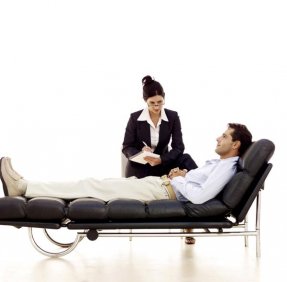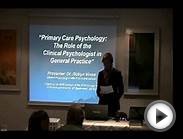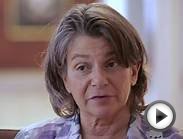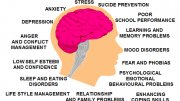
All 20 displayed
- Interact with clients to assist them in gaining insight, defining goals, and planning action to achieve effective personal, social, educational, and vocational development and adjustment.
- Identify psychological, emotional, or behavioral issues and diagnose disorders, using information obtained from interviews, tests, records, and reference materials.
- Use a variety of treatment methods, such as psychotherapy, hypnosis, behavior modification, stress reduction therapy, psychodrama, and play therapy.
- Counsel individuals and groups regarding problems, such as stress, substance abuse, and family situations, to modify behavior or to improve personal, social, and vocational adjustment.
- Discuss the treatment of problems with clients.
- Write reports on clients and maintain required paperwork.
- Consult with or provide consultation to other doctors, therapists, or clinicians regarding patient care.
- Obtain and study medical, psychological, social, and family histories by interviewing individuals, couples, or families and by reviewing records.
- Evaluate the effectiveness of counseling or treatments and the accuracy and completeness of diagnoses, modifying plans and diagnoses as necessary.
- Select, administer, score, and interpret psychological tests to obtain information on individuals' intelligence, achievements, interests, and personalities.
We are pleased to inform you about Moussaka.
- Develop and implement individual treatment plans, specifying type, frequency, intensity, and duration of therapy.
- Refer clients to other specialists, institutions, or support services as necessary.
- Maintain current knowledge of relevant research.
- Consult reference material, such as textbooks, manuals, and journals, to identify symptoms, make diagnoses, and develop approaches to treatment.
- Observe individuals at play, in group interactions, or in other contexts to detect indications of mental deficiency, abnormal behavior, or maladjustment.
- Provide occupational, educational, and other information to individuals so that they can make educational and vocational plans.
- Plan and develop accredited psychological service programs in psychiatric centers or hospitals, in collaboration with psychiatrists and other professional staff.
- Direct, coordinate, and evaluate activities of staff and interns engaged in patient assessment and treatment.
- Develop, direct, and participate in training programs for staff and students.
- Provide psychological or administrative services and advice to private firms and community agencies regarding mental health programs or individual cases.
Knowledge
5 of 8 displayedAll 8 displayed
Source: www.onetonline.org

|
CafePress Clinical Psychologist Cupcake Tote Bag - Standard Multi-color Kitchen (CafePress)
|
You might also like:




|
CafePress Clinical Psychologist cake Mug - S White Kitchen (CafePress)
|




|
CLINICAL PSYCHOLOGIST 7"x10" Aluminum novelty parking sign wall décor art Occupations for indoor or outdoor use. Lawn & Patio (Beach Graphic Pros)
|

|
Clinical Psychologist St Street Sign Home (Idakoos)
|

|
Metal License Plate Worlds hottest Clinical Psychologist - Neonblond Automotive Parts and Accessories (NEONBLOND)
|



















Most all practicing licensed clinical psychologists have a doctorate degree. The doctorate would take approximately four years post bachelor's to complete. The degree can run up to 60 credits in coursework particular to a specific field of study. The actual length of time depends much on how long it takes a student to prepare and defend their dissertation which typically follows the prescribed credit coursework. The dissertation is an individual student project advancing an original view point on a topic of the students choosing. It is developed through extensive supporting research and…